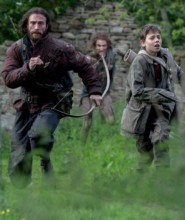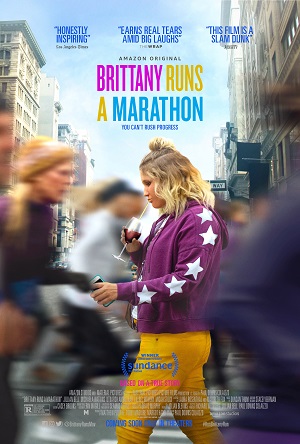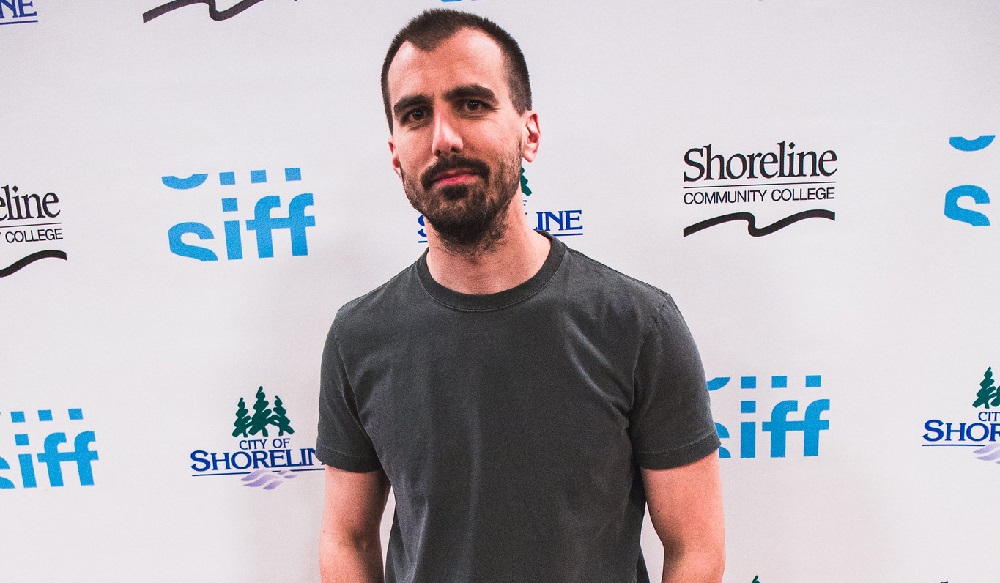
“Brittany Runs a Marathon” – Interview with Paul Downs Colaizzo
by Sara Michelle Fetters - September 4th, 2019 - Film Festivals Interviews
a SIFF 2019 interview
Understanding Character
Brittany Runs a Marathon writer/director Paul Downs Colaizzo on breathing life into his inspirational cinematic debut
Brittany Runs a Marathon writer/director Paul Downs Colaizzo is as surprised by his debut’s success as anyone else might be. “It’s pretty crazy, isn’t it?” asks the filmmaker with a giant grin on his face as we sit in a small conference room at a hotel in downtown Seattle. “This has been a pretty incredible journey. That’s very true.”
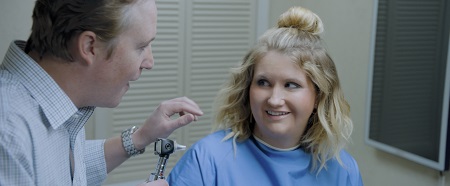
Winning the prestigious Audience Award at this past January’s Sundance Film Festival over some very steep competition which included crowd-pleasing motion pictures like Lulu Wang’s The Farewell, Nisha Ganatra’s Late Night and Gurinder Chadha’s Blinded by the Light, I had the opportunity to sit down with Colaizzo during his Seattle International Film Festival visit towards the end of May. A story inspired by his own roommate’s decision to take up jogging and ultimately attempt to run the New York Marathon, the movie revolves around overweight, unmotivated 27-year-old party girl Brittany (Jillian Bell). After being told by a doctor that her unhealthy lifestyle is starting to showcase symptoms of taking a dangerous told, the young woman is urged by her apartment building’s resident artist Catherine (Michaela Watkins) to try and see if she can run a block. Soon one block becomes two and two becomes three, and before Brittany knows it she’s jogging every day with an eye on running the New York Marathon.
But as tried and true as that empowering and inspirational plot synopsis sounds, Colaizzo’s script isn’t anywhere near as melodramatically straightforward as it could have been. The filmmaker refuses to forgive Brittany for any of her more egregiously selfish missteps, and even though his main character is going out of her way to improve her life and find direction where it wasn’t there before that doesn’t mean she still doesn’t make a number of mistakes as she attempts to find the right path to run on. It’s masterfully complicated stuff, all of which makes speaking with the filmmaker about his own path in regards to breathing life into his debut feature even more interesting and informative. Here are some edited excerpts from our wide-ranging conversation:
Sara Michelle Fetters: I get being inspired by your roommate’s journey and writing this script, but how do you go from being an aspiring filmmaker who’s a showrunner on “MacGyver” to knowing you’re the one who should direct and make this your first movie behind the camera?
Paul Downs Colaizzo: I didn’t think of it that way. I know how things can get ruined, especially in Hollywood, especially with the wrong person at the helm. I thought this story was too important. It needs to be told correctly, and I wanted it to be told with a delicate touch and the right kind of humor, the right kind of pathos. It needed to pay attention to [Brittany’s] inner life. That’s what I looked at. I didn’t really know what directing was, weirdly. [laughs]
Sara Michelle Fetters: And it’s not like you’d written a script before, either.
Paul Down Colaizzo: But I knew what went into telling a story. I understood craft. I understood character. I understood plot, structure and emotionality. You have to understand all of that when you make a film. I had studied drama at Tisch and I loved working with actors. My favorite thing to do was sneak in and work with actors when we were putting on plays. When it came to this film? It’s funny. This is like my marathon, too. Making a movie is like this intimidating thing where you’re saying, “That’s a lot. Can I do it?” And the only way to do it is to do it.
So that’s what I did. I went in and asked if I could direct and they said no. Initially I was like, that’s fair. I’ve never directed anything. It kind of made sense. But It was undaunted. I made a little book as a presentation as to what I wanted to do, and I did a bunch of storyboards for the producers to look at. I went back out there and I was like, I know I can do this and this is what I will do. Afterward they said okay and suddenly I was the director.
Sara Michelle Fetters: That had to be quite the empowering moment.
Paul Down Colaizzo: It was. No question.
Sara Michele Fetters: What was more empowering? Making this movie? Or watching your friend conquer her personal demons and run that marathon?
Paul Down Colaizzo: It’s weird. A movie doesn’t happen in a moment. Brittany’s journey didn’t happen in a moment. But the New York Marathon? This is a moment. It’s like New York is not New York. It’s like everyone is just in support mode and everyone is everyone’s best friend, and you just sob on the subway because there’s so much love and support in the air.
So watching Brittany do that was really moving. I get emotional thinking about it, as is going back and watching the slideshow of my life with Brittany. That is also very emotional and moving, so I don’t know that I can parse them apart, especially because Brittany was also adamant I should direct the film. It’s all sort of one thing.
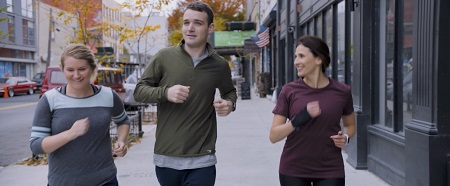
Sara Michelle Fetters: When you take a friend’s story and turn it into a semi-fictionalized story, how do you balance those things that you know are true but might not necessarily work for a drama, and the stuff that you know from her real life that is really dramatic and would be perfect for the story but might not necessarily be something she wants in there? How do you balance all of that?
Paul Downs Colaizzo: It’s a good question. What happened is she went for her first run and I thought, “This is a movie,” that very day. I outlined the movie without telling her I was doing it, and then one day I said to her I don’t know if I should tell you this but I’m writing a movie about you and it’s called Brittany Runs A Marathon. She immediately asked, “How fast does she do it [the New York Marathon] in?” I responded that how fast she ran the marathon wasn’t the point, and I also followed that up by saying that the character got injured and couldn’t run. Two months later Brittany got injured and couldn’t run the marathon. Art suddenly imitated life but in the opposite direction.
It was not like I was mining [Brittany’s] life necessarily, but the story became clear to me week one when she started running. Running is a sport against yourself, so I needed to tell a story that was about a woman against herself. What was that going to be? We both came from theater. We both went to NYU. We both love just cracking each other up. But I’m also gay and in a lot of ways this is my story, too, because there was a moment in my life where I thought that I didn’t want to be the funny sidekick, that I wanted to be the lead in my own life.
There’s a moment in this world where you have to sort of say that you understand what role you’re expected to play and shout out lout that you’re not going to be doing that anymore. Things are going change, and that includes that sad truth that some people are going to have to fall off your radar and some new people are going come on it. You have to be able to say that you deserve this success ad these new friends and be confident that this is the truth. I came out at 23. By the time I moved in with Britney I was 26 and I’d just gone through this metamorphosis of who I was becoming and questioning everything in order to find that sense of self-respect and self-agency.
A family member once said to me, “I’m jealous of the fact that you get to come out.” I asked them why they thought that. “Because straight people don’t get to come out. You get to start over. There’s no socially acceptable way for us to do that.”
I was like, coming out isn’t all peaches and cream, but I still understood what it was they were trying to say. But I do think there are moments in our lives where we all get to say that we are starting over. I got to watch Brittany go through that journey. But as part of that, when you do reinvent your life for the hopefully the better, you can start to focus on the wrong things. We all can. It happened to me when I came out. You start to value the wrong things about yourself and you start to get vain. You’re selfish, but not in a good way. Watching Brittany’s story was also kind of like a way of working through my own story at the same time.
Sara Michelle Fetters: I think one the things that makes this film so universal is that, at the end of the day, it is about learning to love yourself for who you are, which is a really tough thing to do for a lot of people.
Paul Downs Colaizzo: Yes. It is. Learning to love yourself for who you are and wanting to keep growing.
Sara Michelle Fetters: That’s something I struggle with. I think that’s something all of us struggle with. How do you be happy with what is and not let yourself become depressively obsessed with what isn’t? How do you do that? That’s hard.
Paul Downs Colaizzo: It is. But that is the task. Love now and hope for more.
For the movie, I think it comes down to the characters. You’re watching them live their life without saying what’s happening. You get a feeling of what’s happening but you’re not necessarily identifying all of it. By the time we do identify it, you understood that statement to be true. Or, at least, that is the hope.
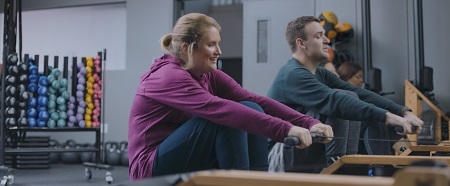
Sara Michelle Fetters: At what point did Jillian Bell come aboard the project?
Paul Downs Colaizzo: About seven months before we started filming.
Sara Michelle Fetters: What were the conversations like between the two of you after she decided to portray Brittany?
Paul Downs Colaizzo: I didn’t know her before she came on. Jillian had gotten hold of the script, and we had a couple of phone calls and then we sat down for coffee. We also had a Skype and it was sort of like, you could just tell she should be Brittany.
From what I knew then was that she was a comedy actress, a comedy actress from a very specific, excellent comedy and she’s a standout. But it was a big question mark if she could do something like this. In talking to her I saw that Jillian wanted to almost have her own marathon with this film. She wanted to crack her own shell. She wanted to change how she looked at herself and how the world looked at her. I know it was intimidating. This whole process was intimidating for me so I knew it was intimidating for her. There were a lot of people climbing small mountains making this film.
I’m a playwright. For me it’s all about the written word. I love rehearsal. I love sitting around a table and talking about the project. Film people don’t give a darn about that stuff. [laughs] We had one rehearsal that was one hour and it was just me and Jillian, and then she had her costume fitting.
Luckily, and I don’t know if it was every week or what, but after she was attached Jillian and I would go over the script whenever we could. She comes from an improv world and I said early on that I wanted to do this word-for-word. She was totally on board with that. Because she related to the character, she related to the character’s journey, and so she was then able to bring so much new, unexpected stuff to the table. We wanted to make sure we were telling the most respectful, honest, true, emotional and vulnerable version of the story.
Our work together was very text heavy. There wasn’t a lot of doing the scenes. It was a lot of understanding, synthesizing and challenging ourselves to look at our misunderstandings of a character. By the time we go on the set we were on the same page of what story we were telling, and that story is happening inside that girl’s heart and inside her soul. So even though we don’t have the same language when it comes to acting and scene work, she’s from improv, I’m from theater, we had the same language when it came to Brittany. That made it easy.
Sara Michelle Fetters: So, in the end, you two found a way to merge your dueling sensibilities as far as the best way to bring Brittany to life.
Paul Downs Colaizzo: That’s what I love about drama. You need to take time to sort of take that character in, and Jillian sitting with the script and understanding it in her heart and her soul was key. By the time she showed up she wasn’t thinking about the words. She was just present. She was just in the moment.
Sara Michelle Fetters: And obviously audiences have responded because you just walked out of Sundance with the Audience Award. What does that feel like?
Paul Downs Colaizzo: That was nuts. When we premiered, I didn’t know what was going to happen. The only people who had seen the rough cut of the film were my friends, and I just finished that cut for Sundance the Tuesday before we got there, so no one had seen that version. I was sitting in the audience and it started and the house manager was sitting next to me and two minutes in I was like, I think you have to turn the volume up because they’re laughing too loud. [laughs] So it went pretty well, and then when the lights went down you could just feel the film had hit a nerve. You see grown men crying.
We did a marketing screening for the film in West Plano, Texas and I was like, what the heck are we doing in West Plano, Texas? The producers wanted to go to the center of the country. They wanted to see how it would play there. I’m telling you, grown cowboys were crying. That was the surprise of the film. I knew women would like the film. I didn’t know men would have the emotional response they have had to it.
Sara Michelle Fetters: But that’s the point, isn’t it? Whether we’re gay, straight, male, female, trans, whatever, I think we can all relate to this journey. Watching Brittany in this movie, I could relate to the feeling/being overweight portion. I could relate to the being the sidekick portion. The moment when she gets injured, I have spent the last four years trying to recover from recurrent calf injuries and just when I’m finally back to almost the top of my game, what did I do this year? I reinjured my calf.
Paul Downs Colaizzo: Stop it. That sucks. I can relate. I had double ankle surgery right after we finished filming.
Sara Michelle Fetters: No! I’m sorry that happened.
But, those moments, these obstacles, that’s what I think we’re talking about here. They are so debilitating. It doesn’t matter who you are, we’ve all had to face moments like these.
Paul Downs Colaizzo: That’s right. And it’s how you respond. Can you get up? Can you keep going? Those are universal questions.
Sara Michelle Fetters: Speaking of getting up and moving forward, what do you want to do next?
Paul Downs Colaizzo: I don’t know. I want to have a weird career. I want to explore characters that we don’t normally ask an audience to empathize with in a provocative, entertaining and philosophical way.
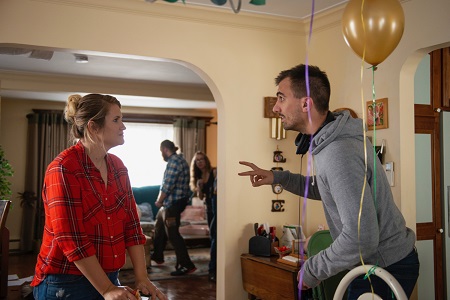
Sara Michelle Fetters: So what is it that inspires you, then? What gets you excited when you wake up in the morning?
Paul Downs Colaizzo: Life. Life gets me excited. But I’m sure mental trauma inspires me in some way or another. I’m sure there’s some childhood crap that I just can’t seem to get over so I’m just doing the rewrites of it hoping to exorcise those demons. [laughs]
Sara Michelle Fetters: And the movie? What do you hope audiences take away after Brittany’s story has come to an end? What do you hope they’re talking about?
Paul Downs Colaizzo: They need to be talking about what they’re going to do tomorrow. That’s what I want. I want someone to have an idea of what they’re going to do tomorrow that might be different than what it is they have done today, Even if they don’t do it, I want people to wonder if they could do something new tomorrow. That would be great.
– Interview reprinted courtesy of the SGN in Seattle



